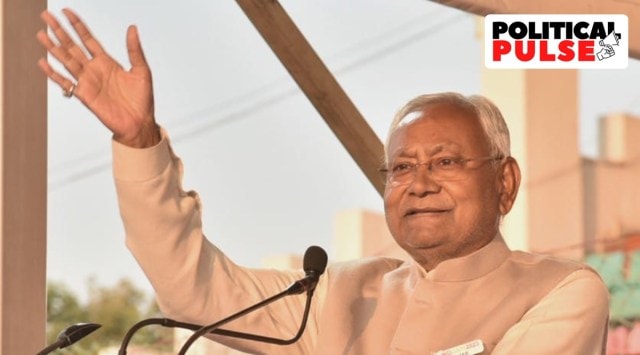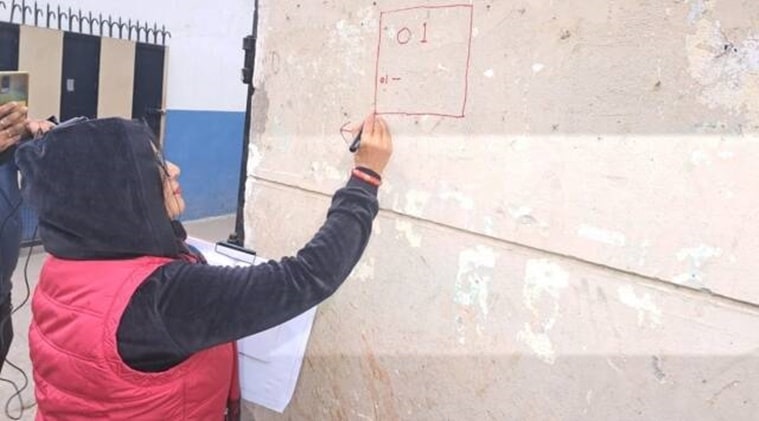In a setback to the Nitish Kumar government, the Patna High Court Thursday stayed the ongoing caste-based survey in Bihar with immediate effect, saying the state government had “no power” to conduct the same as it would “infringe on the legislative powers” of Parliament.
The interim order came days before the census was to be completed by May 15. The Mahagathbandhan government has invested much political stock in the caste census, with most of the Opposition parties putting pressure on the BJP-led Modi government to hold the same across the country.

The High Court order saw the Bihar government’s measure as an infringement upon Parliament rights, suggested that the Bihar government’s exercise was essentially “a Census”, and raised questions regarding privacy and data security. The writ petition, filed by Youth for Equality, a third gender activist and others, would be heard next on July 3.
While Bihar Chief Minister Nitish Kumar did not react to the court verdict immediately, Deputy CM Tejashwi Prasad Yadav told reporters: “Let us first understand the order and its legal nitty gritty. We will sit together with the CM and discuss our next course of action”.
JD(U) MLC and former minister Neeraj Kumar said: “It is only an interim order. The court will pass final orders only after hearing us comprehensively. In any case, we are not the first state to have such a survey as Telangana and Karnataka have already done it, and Odisha is undertaking it.”
RJD national spokesperson Subodh Kumar said: “The court stay should not be taken as a setback but as a possible course correction.”
 An enumerator puts the number on the first house as part of the casste survey in Patna’s Bank Road on Saturday. (Express Photo)
An enumerator puts the number on the first house as part of the casste survey in Patna’s Bank Road on Saturday. (Express Photo)
BJP state president Samrat Choudhary said Nitish Kumar had no one to blame but himself, “for not having presented the state government’s explanation in the court convincingly”. While the BJP at the Centre has been non-committal on a caste survey, the party has backed it in the state. Choudhary said: “We duly supported the survey, but the state government has to be careful about all legal implications related with the process.”
Story continues below this ad
In their interim order Thursday, a Division Bench comprising Chief Justice K Vinod Chandran and Justice Madhuresh Prasad said: “… the petitioners have made out a prima facie case against the continuation of the process of caste-based survey, as attempted by the state of Bihar. There is also the question raised of data integrity and security which has to be more elaborately addressed by the state. Prima facie, we are of the opinion that the state has no power to carry out a caste-based survey, in the manner in which it is fashioned now, which would amount to a Census, thus impinging upon the legislative power of the Union Parliament.”
The Bench further said that the notification issued by the government suggests it intends to share the data with the different parties in the state Assembly. Calling this “a matter of great concern”, the HC said: “There definitely arises the larger question of right to privacy, which the Hon’ble Supreme Court has held to be a facet of right to life… we direct the state government to immediately stop the caste-based survey and ensure that the data already collected are secured and not shared with anybody till final orders are passed in the writ petition.”
The court broadly looked at three contentions of the petitioners before passing the interim order: “(i) whether the expenditure for the massive exercise is with the due sanction of law; (ii) whether the exercise of a caste-based survey is one in accordance with law; & (iii) whether the questions asked result in infringement of privacy”.
The HC said: “With respect to the allegation of Rs 500 crore having been taken from the contingency fund without due appropriation as provided under the Constitution, the legislation on that count as also the Rules of Business framed by the state have to be looked at on the basis of the arguments raised by the advocate general (representing the state), regarding the absence of a challenge to the submission made before this Court, on the strength of which the earlier writ petitions on similar lines were closed.”
Story continues below this ad
On the difference between “census” and “survey”, the HC said Black’s Law Dictionary “defines ‘census’ as an official count of people, made for the purpose of compiling social and economic data of the political subdivision to which the people belong”. ‘Census’ as defined by Webster’s New Collegiate Dictionary is the count of a population and a property evaluation in early Rome, which is almost a complete enumeration of the population, made by the Government. The Concise Law Dictionary by P Ramanatha Aiyar defines it as an official enumeration of the inhabitants of the state or country with details of sex, age, family, occupation, possession etc”.
A “survey”, the court said, is defined in the Oxford Advanced Dictionary as “an investigation of the opinions and behaviour of a particular group of people”, determined by asking them pre-framed questions. Black’s Law Dictionary defines it as an appraisal and a general consideration of something and also includes the measuring of a tract of land. It has also been defined as a poll or questionnaire, especially one examining popular opinions, the HC said.
“The essential difference between a ‘census’ and ‘survey’, as we discern from the above definitions, is that the former contemplates collection of accurate facts and verifiable details, while a survey is intended at collection and analysis of opinions and perceptions of the general public, which may be aimed at a specific community or group of people or the extended community of a polity. Hence, while in a ‘census’, details of an individual are collected, in a ‘survey’, often the opinions and perceptions of the targeted persons are collected… Viewed from the above perspective, the present exercise by the state of Bihar can only be seen as an attempt to carry out a ‘Census’ under the name of a ‘survey’,” the court said, going on to add that the power to carry out a Census rests “in the exclusive domain of Parliament”.
Regarding the question of privacy and data security, the court order mentioned ‘Entry 24’ (in the caste survey form), dealing with issues of labour such as conditions of work, and ‘Entry 30’, with respect to vital statistics such as registration of births and deaths. “We do not find the collection of caste details to be inextricably linked with or related to any of the specific entries pointed out by the state, and these entries are not sufficient and relevant to carry out a collection of caste details from individual citizens,” the HC said.
Story continues below this ad
“It is trite law that when the state does not have the power to legislate, the Executive Government also cannot bring out any orders exercising the executive power under Article 162,” the order added.
Raising another basic question regarding the conduct of the survey, the Bench asked how the head of a family could give information regarding the rest of its members, calling it against the principle of voluntary disclosure. “The details of even the caste and income of every family member would be taken from the head of the family and not from the respective individual, which itself militates against the veracity and integrity of the data supplied. This also stands against the contention taken of voluntary disclosure.
Arguing against the stay, the Bihar Advocate General said: “Data would be entered only after each and every individual, who is a native of Bihar and not resident within the state, at the time of survey, (has been) contacted and the enumerator has verified the data through video-conferencing.”
After the order, the state government said it would deal with all the points raised by the court in a counter-affidavit, to be filed before the next date of hearing.
Story continues below this ad
On the state’s argument that the data collected is already available in the public domain, with “different individuals having given it for the purpose of availing reservation, social welfare measures, getting employment and so on and so forth”, the court said that if this was the case, “we fail to understand why such a massive exercise, expending public resources, has to be undertaken”.
The HC said that the state government should instead set up a commission for this, so as to meet its stated objective of ensuring proportionate representation for communities in local self-government institutions.



 An enumerator puts the number on the first house as part of the casste survey in Patna’s Bank Road on Saturday. (Express Photo)
An enumerator puts the number on the first house as part of the casste survey in Patna’s Bank Road on Saturday. (Express Photo)



























